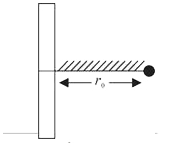A particle of mass 40 mg and carrying a charge 5×10−9C is moving directly towards a fixed positive point charge on magnitude 10−8C. When it is at a distance of 10 cm from the fixed positive point charge it has a velocity of 50cms−1 at what distance from the fixed point charge will the particle come momentarily to rest ? Is the acceleration constant during motion?
If the particle comes to rest momentarily at a distance r from the fixed charge, then from .conservation of energy. we have
12mv2+14π∈0Qqa=14π∈0Qqr
Substituting the given data, we get
12×40×10−6×12×12
=9×109×10−8×5×10−9[1r−10]
or 1r−10=5×10−49×5×10−8=1009or,1r=1009+10=1909m
i.e, r=4.7×10−2m
As here, F=14π∈0qQr2,soa=Fm∝1r2
i.e., acceleration is not constant during motion.
Topper's Solved these Questions
- ELECTROSTATIC POTENTIAL AND CAPACITANCEBOOK - NARAYNACHAPTER - ELECTROSTATIC POTENTIAL AND CAPACITANCEEXERCISE - Evaluate yourself-1
5 Videos
- ELECTROSTATIC POTENTIAL AND CAPACITANCEBOOK - NARAYNACHAPTER - ELECTROSTATIC POTENTIAL AND CAPACITANCEEXERCISE - Evaluate yourself-2
8 Videos
- ELECTROMAGNETIC WAVES BOOK - NARAYNACHAPTER - ELECTROMAGNETIC WAVES EXERCISE - EXERCISE -4
15 Videos
- ELECTROSTATICS AND GAUSS LAWBOOK - NARAYNACHAPTER - ELECTROSTATICS AND GAUSS LAWEXERCISE - Intergers type question
11 Videos
Similar Questions
A particle of mass 400mg and charged with 5×10−9C is moving directly towards a fixed positive point charge of magnitude 10−8C. When it is at a distance of 10 cm from the fixed positive point charge it has a velocity of 50 cm/s. At what distance from the fixed point charge will the particle come momentarily to rest ? Is the acceleration constant during the motion ?
View SolutionA charged particle (q,m) is moving directly towards fixed positive charge Q. When it is at distance d from Q, it has speed v0. At what distance Q will be particle come momentarily to rest ? Is the acceleration constant during motion ?
View Solution
Knowledge Check
Two positive charges of magnitude 4C and 6C are placed 10cm apart . The electric potential at a distance of 10cm from the middle point on the right bisector of the line,joining the two charges is
A5×1011VB4×109VC8×1011VD5×109VA particle A of mass m and charge Q moves directly towards a fixed particle B, which has charge Q. The speed of A is a v when it is far away from B. The minimum separtion between the particles is not proportional to
AQ2B1v2C1vD1mAn agent is moving a positively charged body towards another fixed positive charge. The work done by the agent is
ApositiveBnegativeCzeroDmay be positive or negative
A particle of mass 100 gm and charge 2μC is released from a distance of 50 cm from a fixed charge of 5μC. Find the speed of the particle when its distance from the fixed charge becomes 3 m.
View SolutionA particle of mass 100 gm and charge 2μC is released from a distance of 50 cm from a fixed charge of 5μC. Find the speed of the particle when its distance from the fixed charge becomes 3 m.
View SolutionA positive point charge is released from rest at a distance r0 from a positive line charge with uniform density. The speed (v) of the point charge, as a function of instantaneous distance r from line charge, is proportional to:

View SolutionTwo point charges of +2×10−8C are placed 6 apart. Determine the force on a point charge of +1×10−8C placed at a distance of 5 cm from each of the two given charges.
View SolutionTwo point charge Q and 4Q are fixed at a distance of 12cm from each other. Sketch lines of force and locate the neutral point, if any .
View Solution
